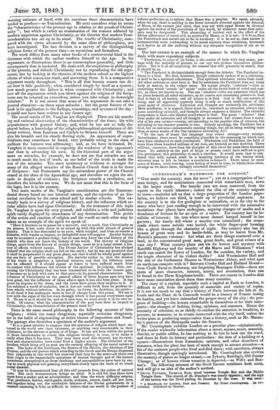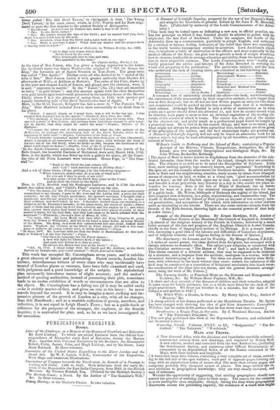CUNNINGHAM'S HANDBOOK FOR LONDON. * " Cori made the country, man
the town " ; yet as a congregation of hu- man beings, and for associations connected with remarkable men, town is the larger study. The bucolic race are soon mastered, from the squire to the rustic labourer ; indeed the elite of the country migrate to town—statistics tell us that a large proportion of the London popu- lation, we believe one third, is made up of provincial aspirants. As the country is to the few geologists or naturalists, so is the city to the many who have just reading enough to be interested with the successive mutations that places have undergone, arguing changes of modes and a decadence of fortune fit for an epic or a satire. The country has its lo- calities of interest: the tree where some damsel hanged herself in her garters ; the lonely dell where a murder was committed ; the cross- roads where some suicide was buried, the white finger-post looming like a ghost through the obscurity of night. The country also has its houses of great men and its battle-fields, as may be learnt from Mr. Howitt's pleasant volumes : but what are these things scattered over a land, to the concentrated great men, great deeds, and great crimes of a vast city? What country place can vie for horror and mystery with Ratcliffe Highway and the murder of the Marrs and Williamson? what castle can match the Tower of London, for the number, the variety, and the tragic character of its violent deaths ? Add Westminster Hall and the site of the Parliament Houses to Westminster Abbey, and what spot on earth can compete with it? Between Crosby Hall and Holland House— from Chalk Farm to Battersea, not forgetting Montague Fields—there are spots of more character, interest, action, and association, than can be found in the Three Kingdoms beside. There are courts in London that have more association about them than many counties. The story of a capital, especially such a capital as Paris or London, is difficult to tell, from the quantity of materials and variety of topics. It is not too much to say that a history of Paris between the Isle de St. Louis and the Place de la Concorde would be a history of France bating its battles, and yet leave untouched the proper story of the city: the pro- gress of building—the houses remarkable in themselves or for their occu- pants—the changes of fashion, living, opinions, and manners. Hence the necessity of selection, so as chiefly to confine the attention to localities, to persons, to manners, or to events connected with the city itself, unless the writer aims at producing essays rather than a history, such as Mr. Macau- lay's picture of the Metropolis under the Stuarts. Mr. Cunningham exhibits London on a peculiar plan—alphabetically. If the reader wishes for information about a street, square, court, mansion, district, or public edifice, he has nothing to do but to look out the word, and there be finds its history and particulars : the date of a building or a square—illustrations from dramatists, satirists, and other describers of manners, when the place has been of mark enough to attract attention—a list of the eminent people who lived and died there; with anecdotes, always illustrative, though sparingly introduced. Mr. Cunningham also revives the memory of places no longer extant,—as Tyburn, Ranelagh, Old Exeter 'Change; or of houses whose vocation is departed,—as Will's and But- ton's. The following account of the Devil Tavern combines both sorts, and will give an idea of the author's method. a DEVIL TAVERN, TEMPLE Ban, stood between Temple Bar and the Middle Temple Gate. The church of St. Danstan's was nearly opposite ; and the sign of the tavern was the Devil pulling St. Dunstan by the nose. It was some-
* A Handbook for London, Put and Present. By Peter Cunningham. In two volumes. Published by Murray. times called The Old Devil Tavern,' to eistingnish it from ' The Young Devil Tavern,' in the same street, where, in 1707, Wanley and Le Neve origi- nated or gave the first impulse to the present Society of Antiquaries.
" Bloodhound. As you come by Temple-bar, make a step to th' Devil. " Tim. To the Devil, father? " Sim. My master means the sign of the Devil ; and he cannot hart you, fool;
there 's a saint holds him by the nose.
" 78m. Sniggers, what does the Devil and a saint both In one sign ? Sint. What a question's that? What does my master and his prayer-book o' Sunday both In a pew?" A Match at Midnight, by William Rowley, 4to. 1633. " All In that very house where Saint
Holds Devil by the nose ; Three Drunkards met to roar and rant,
But quarrell'd in the close." Sir Charles Sedley, Works, 1. 74.
In the time of Ben Jonson, who has given a lasting reputation to the house, the landlord's name was Simon Wadloe—the original of " Old Sir Simon the King," the favourite air of Squire Western in Tom Jones. The great room was called " The Apollo!" Thither came all who desired to be " sealed of the tribe of Ben." Here Jonson lorded it with greater authority than Dryden did afterwards at Will's, or Addison at Button's. The rules of the Club, drawn up in the pure and elegant Latin of Jonson, and placed over the chimney, were, it is said, " engraven in marble." In the " Tatter," (No. 79,) they are described as being " in gold letters"; and this account agrees with the rules themselves —in gold letters upon board—still preserved in the banking-house of the Messrs. Child; where I had the pleasure of seeing them in 1843, with another and equally interesting relic of the Devil Tavern—the bust of Apollo. • * * Here, in the aivil Tavern, Killigrew has laid a scene in " The Parson's Wed- ding." Here Shadwell imitated Jenson more successfully in his drink than in his plays. "Oldwit. I myself, simple as I stand here, was a wit in the last age. I was created Ben Jonson's son In the Apollo."—Shadwell, Bury Fair, 4to. 1680. "The memory of those grave gentlemen is their only plea for being wits. They can tell a story of Ben Jonson, and perhaps have had fancy enough to give a sup- per In Apollo, that they might be called his sons."—Dryden, Defence of the EPaor• " Couxmare the latter end of this sentence with what the two authors of the Beitections, or perhaps the associating club of the Devil Tavern, write In the beginning of their Ilbel."—Dryden, Vindication of the Duke of Guise. I have hitherto contented myself with the ridiculous part of him [Shadwell], which is enough in all conscience to employ one man ; even without the story of his late fall at the Old Devil, when he broke no ribs, because the hardness of the stairs could reach no bones."—Dryden, Vinci. of the D. of Guise. 'In the Apollo Chamber adjoining to the Old Devil Tavern,' the jewels of La Belle Stuart, the beautiful Duchess of Richmond, were sold, March 18th, 1703. Here, in the Apollo, which was fitted up with a gallery for music, all the Court- day odes of the Poets Laureate were rehearsed. Hence Pope, in" The Dun- eiad "—
" Back to the Devil the last echoes roll,
And Coll each butcher roars at Plockley-Hole:. And a wit of those times, (Pope, perhaps,) in the following epigram- " When Laureate makes odes, do you ask of what sort? Do you ask if they're good, or are evil? You may judge—From the Devil they come to the Court, And go from the Court to the Devil."
Here, in 1774, Kenrick read his Shakspere Lectures; and in 1788 the whole tavern was taken down, and " Child's Place" erected on the site. "For the music, [of the Triumph of Peace, by Shirley,] which was particularly committed to my charge, I gave to Mr. Ives and Mr. Lewes 1001. a piece for their rewards; for the four French gentlemen, the Queen's servants, I thought that a handsome and liberal' gratifying of them would be made known to the Queen their mistress, and well-taken by her. I therefore invited them one morning to a collation att St. Dunstan's taverne, in the great room, the oracle of Apollo ; where each of them had his plate lay'd for him, covered, and the napkin by it ; and when they opened their plates they found in each of them forty pieces of gould, of their master's eoyne, for the first dish, and they had cause to be much pleased with the surprisall."—Whitelecke, (Barney's Dist. of Music, M. 576). 22 April, 1661. My Lord Monk rode bare after the King [Charles IL going from the Tower to Whitehall], and led in his band a spare horse, as being Master of the Home. The King, in a most rich embroidered suit and cloak, looked most noble. Wadlow, the vintner, at the Devil in Fleet Street, did lead a fine com- pany of soldiers, all young Comely men, In white doublets."—Pepys. 28 June, 1667. Mr. Lowther tells me that the Duke of Buckingham do dine pub- llokly at Wadlow's at the Sun Tavern."—Pepya. . "One O likes no language but the Faery Queen ; A Scot will light for Christ's Kirk o' the Green ;
And each true Briton is to Ben so civil,
He swears the Muses met him at the Devil."— Pope. "Oct.12, 1710. I dined today with Dr. Garth and Mr. Addison, at the Devil Tavern by Temple-bar, and Garth treated."—Swift, Journal toSielia."
This work has occupied Mr. Cunningham seven years, and it exhibits a great amount of labour and painstaking. Parish records, London his- torians, miscellaneous writers of every class who may incidentally have treated of London places or customs, have been fully examined and used, with judgment and a good knowledge of the subject. The alphabetical plan necessarily introduces names of slight account ; and the author's method of quoting authorities, instead of presenting their pith, sometimes leads to an undue exhibition of words or circumstances that are alien to the object. Mr. Cunningham has a failing too (if it may be called such) —he is strictly matter-of-fact, and gives no rein to his fancy : be never travels beyond the record. It is easy to imagine a more striking and im- pressive picture of the growth of London as a city, with all its changes, than this Handbook ; and as a readable collection of gossip, anecdote, and reflection, it is not equal to Leigh Hunt's Town ; but as a guide-book or reference for the purposes of the stranger, the explorer, or the fireside inquirer, it is unrivalled for plan, and, so far as we have investigated it, for execution.



























 Previous page
Previous page